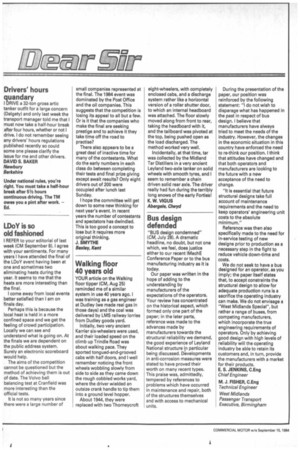Bus design defended
Page 28

If you've noticed an error in this article please click here to report it so we can fix it.
"BUS design condemned" (CM, July 28). A dramatic headline, no doubt, but not one which, we feel, does justice either to our recent IMechE Conference Paper or to the bus manufacturing industry as it is today.
Our paper was written in the hope of adding to the understanding by manufacturers of the expectations of the operators. Your review has concentrated on the historical aspect, which formed only one part of the paper; in the later parts, reference was made to the advances made by manufacturers towards the structural reliability we demand, the good experience of Leyland National structure in particular being discussed. Developments in anti-corrosion measures were stated to have proved their worth on many recent types. This praise was, admittedly, tempered by references to problems which have occurred in maintenance and repair, both of the structures themselves and with access to mechanical units. During the presentation of the paper, our position was reinforced by the following statement: "I do not wish to disparage what has happened in the past in respect of bus design. I believe that manufacturers have always tried to meet the needs of the industry. However, the changes in the economic situation in this country have enforced the need to re-think our position. I think that attitudes have changed and that both operators and manufacturers are looking to the future with a new acceptance of the need to change.
"It is essential that future structural designs take full account of maintenance requirements and the need to keep operators' engineering unit costs to the absolute minimum."
Reference was then also specifically made to the need for in-service testing of new designs prior to production as a necessary step in the fight to reduce vehicle down-time and costs.
We do not seek to have a bus designed for an operator, as you imply; the paper itself states that, to accept constraints the structural design to allow for adequate production runs is a sacrifice the operating industry can make. We do not envisage a "West Midlands Special", but rather a range of buses, from competing manufacturers, which incorporate the true engineering requirements of operators. Only by achieving good design with high levels of reliability will the operating industry be able to retain its customers and, in turn, provide the manufacturers with a market for their products.
E. S. JENKINS, C.Eng Chief Engineer M. J. FISHER, C.Eng Technical Engineer West Midlands Passenger Transport Executive, Birmingham






























































































